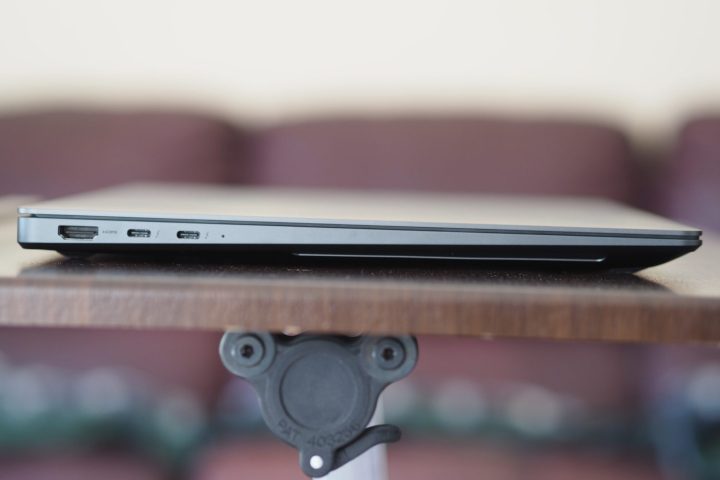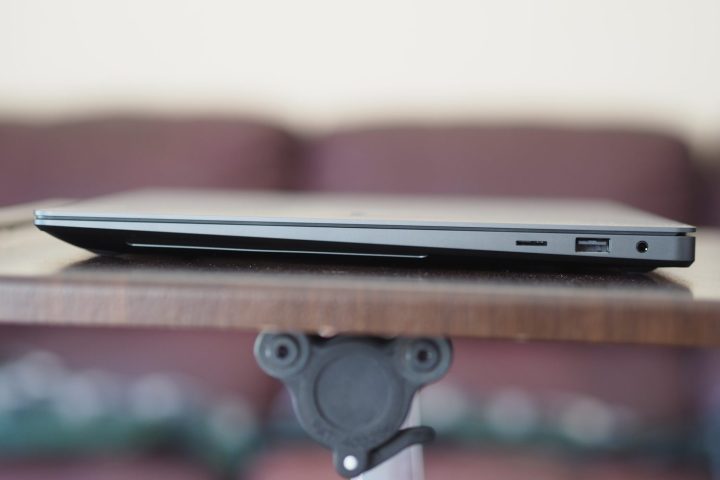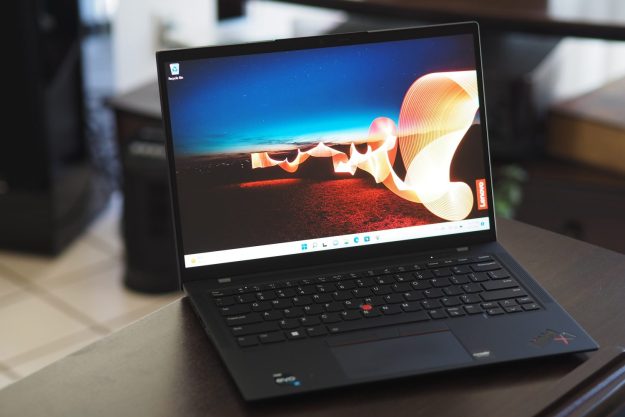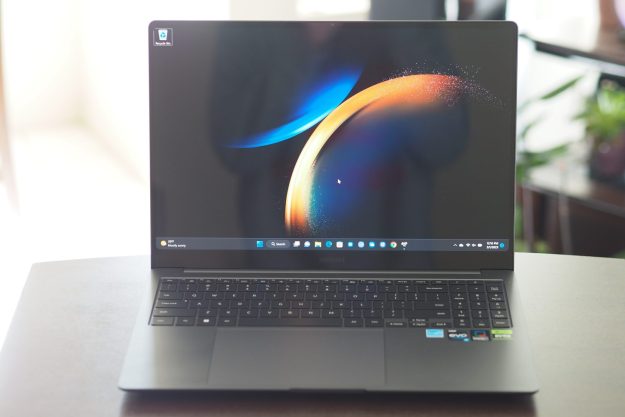
“The Samsung Galaxy Book3 Ultra is a laptop that can handle demanding creative tasks in a chassis that's relatively thin and light for a 16-inch machine.”
- Excellent productivity performance
- Solid creative performance
- Outstanding display
- Great touchpad
- Solid build
- Expensive
- Below-average battery life
The Samsung Galaxy Book3 Ultra is the most powerful Galaxy Book the company has created so far. At least, it can be configured that way, and as we’ll see in our testing, even the entry-level machine can make for a solid video-editing laptop.
It’s also a very expensive laptop, currently starting at $2,200 with an eventual starting list price of $2,400. The most expensive model is $3,000, putting it solidly in the premium laptop class. Fortunately, it offers enough to make it a good choice even given the high price.
Specs and configurations
| Samsung Galaxy Book3 Ultra | |
| Dimensions | 13.99 inches x 9.86 inches x 0.65 inches |
| Weight | 3.95 pounds |
| Processor | Intel Core i7-13700H Intel Core i9-13900H |
| Graphics | Nvidia GeForce RTX 4050 Nvidia GeForce RTX 4070 |
| RAM | 16GB 32GB |
| Display | 16.0-inch 16:10 3K (2,880 x 1,800) OLED |
| Storage | 512GB PCIe SSD 1TB PCIe SSD |
| Touch | No |
| Ports | 2 x USB-C with Thunderbolt 4 1 x USB-A 3.2 Gen 2 1 x HDMI 1 x 3.5mm audio jack 1 x microSD card reader |
| Wireless | Wi-Fi 6E and Bluetooth 5.1 |
| Webcam | 1080p |
| Operating system | Windows 11 |
| Battery | 76 watt-hours |
| Price | $2,200+ |
Samsung has a few configurations of the Galaxy Book3 Ultra currently available. The entry-level model, currently listed at $2,200, has an Intel Core i7-13700H, 16GB of RAM, a 512GB SSD, an Nvidia GeForce RTX 4050, and the 16.0-inch 3K OLED display that’s the only option. My $2,400 review unit was the low-end model with a 1TB SSD. At the high end, the laptop is configured with a Core i9-13900H, 32GB of RAM, a 1TB SSD, and an RTX 4070 for $3,000. Note that you can’t mix and match the CPU and GPU.
The Galaxy Book3 Ultra is a premium laptop that’s quite expensive when maxed out. I was a bit disappointed that Samsung sent a lower-end configuration. The Galaxy Book3 Ultra will be a much stronger competitor against some other 16-inch laptops when configured with the Core i9 and RTX 4070, in both gaming and creative applications. Note that prices are subject to change from what’s currently listed on the Samsung website.
A reasonably thin and light but conservative design
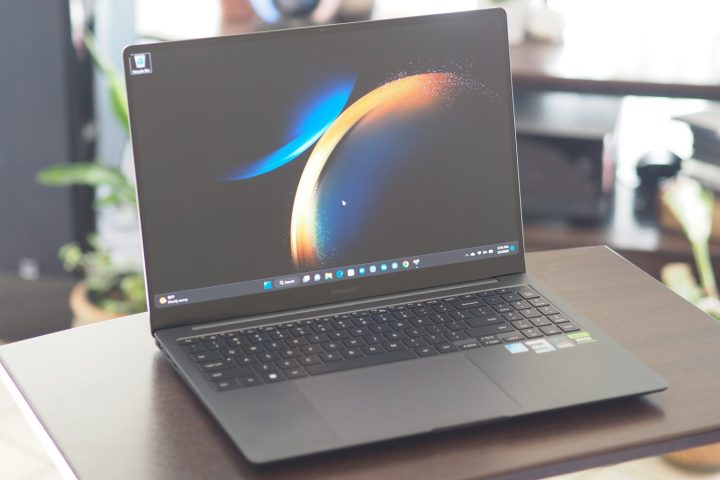
The all-black Galaxy Book3 Ultra has clean lines and a minimalist design, like so many laptops today. Little stands out aesthetically, but that doesn’t make it an unattractive laptop by any means. It’s quietly and conservatively good-looking, which makes it a suitable fit for any computing environment.
It’s reasonably thin at 0.65 inches, although not as thin as the Galaxy Book3 Pro 360 which comes in at an astounding 0.49 inches, and it’s quite a bit heavier at 3.95 pounds compared to 3.3 pounds. But compared to other laptops in its class, like the Dell XPS 15 and Lenovo ThinkPad X1 Extreme Gen 5, the Galaxy Book3 Ultra is nicely sized. Its display bezels are thin and modern across the top and sides, but the bottom chin is a bit chunky. Even so, it manages to fit into a chassis that’s compact enough for a 16-inch laptop.
The aluminum chassis feels reasonably solid, with zero flexing or twisting, but the lid is slightly bendable. Dell’s XPS 15 and the Apple MacBook Pro 16 both best it in build quality, but it nevertheless feels premium. The lid opens with one hand but is a bit wobbly during use. That could be tightened up a bit.

The keyboard has comfortable keycaps and plenty of spacing, even with the numeric keypad. The switches are a bit shallow and don’t have quite the precision you’ll find on the XPS 15 or the MacBook Pro 16 (which has the best laptop keyboard), but it’s still comfortable for long-term typing once you get used to the feel. The touchpad is large and precise, with confident clicks that are just the tiniest bit loud.
The Galaxy Book3 Ultra has a good selection of ports, both modern and legacy, and its wireless connectivity is up to date. The webcam is 1080p, and Samsung touts its Studio Mode and dual mics to highlight the laptop’s effectiveness for videoconferencing. There’s no infrared camera for Windows 11 Hello passwordless login, but the fingerprint reader embedded in the power button works just as well.
A nice boost in performance

As I mentioned above, I was disappointed that Samsung sent a lower-end model of the Galaxy Book3 Ultra. With a 13th-gen Intel Core i7-13700H, a 45-watt 14-core (six Performance and eight Efficient), 20-thread CPU with a Max Turbo frequency of 5.0GHz, it sports a solid CPU, but one that on paper isn’t much faster than the Core i7-12700H it replaced. The laptop is also available with the Core i9-13900H with a faster Max Turbo frequency. And the RTX 4050 is Nvidia’s latest entry-level GPU, which is much slower than the RTX 4070 that comes with the Core i9 models.
That would appear to place my review unit in a different class of laptop, especially regarding gaming and creative applications that can use the GPU. But things weren’t so straightforward. In our CPU-intensive benchmarks, the Galaxy Book3 Ultra was faster across the board, beating out both the Core i7-12700H and 28-watt P-series CPUs with 12 cores (four Performance and eight Efficient) and 20 threads in most of our tests. That’s a decent bump up from the previous generation.
Things were the same in the Pugetbench Premiere Pro 2022 benchmark that runs in a live version of Adobe’s Premiere Pro video editing application, as long as the machine was run in performance mode. That app can use the GPU to speed up various tasks, and here the Galaxy Book3 Ultra wasn’t a standout performer in normal mode where it hit just 679. That’s slower than the Lenovo Slim 7 X Pro with a Core i7-12700H and an RTX 3050, which scored 716 in normal mode and 769 in performance mode. It barely beat out the LG UltraPC 17 with a Core i7-1260P and RTX 3050 Ti, which hit 633 and 651, respectively. It beat out the Apple MacBook Air with Apple’s M2 CPU, which scored 497, but unsurprisingly was trounced by the much faster MacBook Pro 14 with the M2 Max that hit 1,093.

When I switched to performance mode, though, things changed dramatically. The Galaxy Book3 Ultra managed a surprising 982, which is in another class entirely. That’s even competitive with the MacBook Pro 14. I expect that the Core i9/RTX 4070 model would perform even better in this benchmark, again making it a shame that I couldn’t test it. Samsung utilizes Nvidia RTX Studio drivers that are optimized for creative tasks, and they probably helped out.
Overall, the Galaxy Book3 Ultra is a strong performer for demanding productivity workflows, and in performance mode, it does quite well in creative tasks. It’s Samsung’s most powerful Galaxy Book, so that makes sense. And there’s another gear available if you’re willing to spend a few hundred extra dollars.
| Geekbench (single / multi) |
Handbrake (seconds) |
Cinebench R23 (single / multi) |
PCMark 10 Complete |
|
| Samsung Galaxy Book3 Ultra (Core i7-13700H) |
Bal: 1,647 / 12,206 Perf: 1,815 / 12,307 |
Bal: 80 Perf: 74 |
Bal: 1,712 / 13,278 Perf: 1,908 / 14,938 |
7,038 |
| Asus Vivobook 17X (Core i7-12700H) |
Bal: 1,698 / 8,339 Perf: 1,698 / 8,558 |
Bal: 93 Perf: 87 |
Bal: 1,681 / 11,083 Perf: 1,717 / 12,552 |
5,665 |
| Lenovo Slim 7i Pro X (Core i7-12700H) |
Bal: 1,670 / 11,971 Perf: 1,730 / 12,356 |
Bal: 90 Perf: 79 |
Bal: 1,731 / 11,379 Perf: 1,791 / 13,276 |
6,322 |
| Samsung Galaxy Book3 Pro 360 (Core i7-1360P) |
Bal: 1,800 / 8,960 Perf: 1,781 / 9,071 |
Bal: 109 Perf: 99 |
Bal: 1,711 / 8,389 Perf: 1,750 / 9,182 |
5,857 |
| Lenovo Slim 9i (Core i7-1280P) |
Bal: 1,720 / 10,115 Perf: 1,726 / 11,074 |
Bal: 114 Perf: 95 |
Bal: 1,795 / 9,467 Perf: 1,824 / 11,301 |
5,442 |
| Lenovo ThinkPad Z16 (Ryzen 7 PRO 6850H) |
Bal: 1,360 / 8,648 Perf: 1,365 / 8,679 |
Bal: 88 Perf: 87 |
Bal: 1,376 / 10,938 Perf: 1,374 / 11,553 |
5,647 |
| Apple MacBook Air M2 (M2) |
Bal: 1,925 / 8,973 Perf: N/A |
Bal: 151 Perf: N/A |
Bal: 1,600 / 7,938 Perf: N/A |
N/A |
With a discrete GPU, even the entry-level RTX 4050, you might be tempted to do some gaming on the Galaxy Book3 Ultra. It’s worth looking at how the RTX 4050 compares to the RTX 3050, and given its performance, the RTX 3050 Ti as well.
The RTX 4050 provides a clear uplift in gaming performance over the RTX 3050 Ti and the RTX 3050. This was apparent in both the 3DMark Time Spy test results and Fortnite performance, particularly impressive given the Nvidia RTX Studio drivers that are optimized for creative apps and not gaming. If you want a true gaming laptop, you’ll want to choose the RTX 4070 configuration, but the Galaxy Book3 Ultra entry-level model provides solid performance in lower-end and esports titles.
| 3DMark Time Spy |
Fortnite (Epic, 1200p) |
|
| Samsung Galaxy Book3 Ultra (RTX 4050) |
Bal: 6,454 Perf: 7,486 |
Bal: 66 fps Perf: 84 fps |
| LG UltraPC 17 (RTX 3050 Ti) |
Bal: 5,718 Perf: 5,894 |
Bal: 49 fps Perf: 59 fps |
| Dell XPS 15 (RTX 3050 Ti) |
Bal: 4,470 Perf: 4,520 |
Bal: 57 fps Perf: 56 fps |
| Lenovo Slim 7i Pro X (RTX 3050) |
Bal: 4,134 Perf: 5,008 |
Bal: 46 fps Perf: 58 fps |
| Dell Inspiron 14 Plus (RTX 3050) |
Bal: 4,438 Perf: 4,358 |
Bal: 44 fps Perf: 43 fps |
| MSI Prestige 14 (RTX 3050) |
Bal: 4,438 Perf: 4,451 |
Bal: 23 Perf: 26 |
With only a 76-watt-hour battery, a 45-watt CPU, and a power-hungry high-res OLED display, I wasn’t expecting the best battery life from the Galaxy Book3 Ultra. What I got was a little less than average.
The Galaxy Book3 Ultra managed 8.75 hours in our web browsing test and about 7.5 hours in the PCMark 10 Applications test. The latter is the best indication of typical light productivity use, meaning that the laptop is unlikely to get you through a full day’s work without a charge. Like the Galaxy Book3 Pro 360, the Book3 Ultra wouldn’t complete our video looping test, so I guess that Samsung needs to tweak the display drivers.
A creator’s display
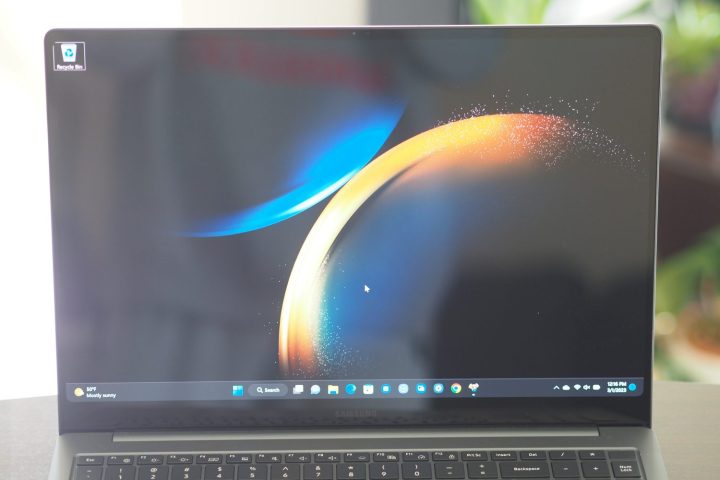
Samsung used the same 16.0-inch 16:10 AMOLED X2 display that we tested in the Galaxy Book3 Pro 360. It offers a high resolution of 2880 x 1800 and a fast refresh of 120Hz. It was equally spectacular out of the box, with the usual deep blacks, plenty of brightness, and attractive colors that aren’t oversaturated.
It also suffered the same issue with my colorimeter, where it returned a 0:1 contrast ratio. Clearly, there’s something Samsung is doing with the display that’s confusing the colorimeter, but I’m willing to bet that the contrast is just as good as with other OLED displays. It was bright at 428 nits, offered 100% sRGB and 99% AdobeRGB color gamut coverage, and enjoyed excellent accuracy at a DeltaE of 0.83 (less than 1.0 is what creators are looking for). All of these are expected results for OLED panels.
Overall, the Galaxy Book3 Ultra offers a display that matches its creativity performance, and it’s also good at displaying HDR streaming video. And its 120Hz makes Windows 11 a much smoother experience.
Audio is provided by two 5-watt woofers and two 2-watt tweeters, and it puts out clear sound with enough volume to be usable for streaming video and music. Mids and highs were clear and there was some bass as well. The XPS 15 and MacBook Pro 16 still offer the best audio in this laptop class, but the Galaxy Book3 Ultra does just fine.
Expensive, but a good laptop for creators
As long as you run the Galaxy Book3 Ultra in performance mode, you’ll get some good creativity performance out of it. And that’s with the entry-level machine, which exceeded my expectations in this regard. Spend the money and upgrade to the more powerful model, and you’ll have a machine that’s relatively thin and light for moderately demanding video editing workflows. And the display is a creator’s dream.
It’s not cheap, though, which needs to be considered. It’s less expensive than some other powerful laptops, like the Apple MacBook Pro 16, but it’s a lot more than many other premium
Editors' Recommendations
- Windows 10 Home vs. Pro vs. S mode: What’s the difference?
- The best HP laptops
- USB-C charging laptops: Here’s what you need to know
- The best desktop computers for 2023: Dell, HP, Apple, and more
- The best tablets in 2023: top 9 picks you should buy
